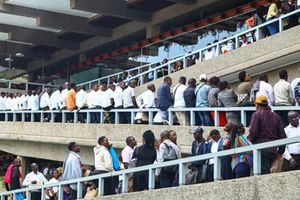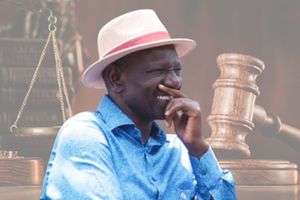
President William Ruto in Othaya town on the final day of his Mt Kenya development tour on April 5, 2025.
President William Ruto seems to be a man entangled in a web of battles as he flirts with one headache after another, with the 58-year-old hardly catching a break since assuming power.
The Head of State has weathered a litany of storms since succeeding Uhuru Kenyatta in September 2022; be it from the courts, the Gen Z, civil society, political front and even within his Kenya Kwanza administration.
But when he thinks he has successfully navigated one challenge, another crops up, testing even more the foundation of his shaky administration. The move by the President last Thursday to nominate a new chairperson and members of the Independent Electoral and Boundaries Commission (IEBC) to end the more than two-year wait for a new electoral body has attracted opposition rather than excitement.
In a surprise move, Dr Ruto opted against high-profile names – former Chief Registrar of the Judiciary Anne Amadi and ex-chairperson of the Commission for the Implementation of the Constitution Charles Nyachae, who had been touted as leading contenders for the critical position – to nominate former Turkana County Attorney Erastus Ethekon for appointment as chairperson of the IEBC, pending his approval by MPs.
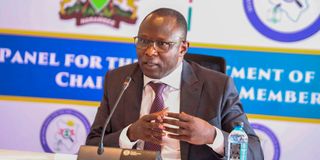
Erastus Edung Ethekon has been nominated by President William Ruto as IEBC chairperson.
Dr Ruto also named Registrar of Political Parties Ann Nderitu, Moses Mukhwana, Mary Karen Sorobit, Hassan Noor, Francis Aduol and Fahima Abdallah as commissioners. However, the Elections Observation Group is now demanding the immediate publication of the recruitment report, saying it was only submitted to the President but not made public. According to the lobby, failure to release the report will only deepen suspicions over and promote unnecessary speculations.
“We demand the immediate release of the full recruitment report. Transparency and accountability through observance of open data principles are fundamental for good governance, and withholding of this report undermines public trust, raising serious concerns about the integrity of the recruitment exercise…,” its Thursday statement reads.
The opposition, led by Wiper leader Kalonzo Musyoka and former CS Eugene Wamalwa, said the development lacked consultation. Questions have been raised about the impartiality of some of the nominees with reported links to Dr Ruto and opposition leader Raila Odinga.
Governors have also rejected the Sh405 billion the National Treasury has allocated to counties in the next financial year. They want the counties given Sh536 billion. Dr Ruto will infuriate governors more after his administration took away Sh11 billion roads funds, as a stalemate with county chiefs over the Road Maintenance Levy Fund persists.
This dispute on allocation to counties that has senators and members of the National Assembly reading from different scripts could disrupt the budget process and derail the Division of Revenue Bill, 2025. The looming standoff could derail Budget approvals, triggering a prolonged tussle between the national and county governments. Such a clash has the potential to strain the already tense relationship between the two levels of government.
“The standoff is expected and will persist. At the time of Gen Z protests, the mediated figure was Sh400 billion. Now they want to give us Sh405 billion, yet we have piling non-discretionary expenses. This is a big joke. This will have an effect on the Budget-making process,” said Makueni Governor Mutula Kilonzo Jnr.
Adding to the feud with governors, the Treasury is also struggling to timely disburse equitable share allocation to the counties, despite a promise by Dr Ruto that his government would not starve counties of funds. The Treasury faces an uphill task of clearing a financial backlog of Sh162.7 billion owed to the counties by next month, made up of arrears for the last financial year amounting to Sh58 billion and outstanding balances for this fiscal year.
Delays in disbursements to the counties hurt service delivery and payment to suppliers and contractors. The counties have had to endure delayed disbursements amid revenue shortfalls and mounting debt payments.
“They have partially disbursed to a few counties the allocation for March. So we have a backlog of two months. Remember we got budget cuts in the middle of the financial year because of Gen Z protests,” Mr Kilonzo Jnr said.
Dismal ordinary revenue collection and a Finance Bill with major concessions present a headache for Dr Ruto on how to balance between political survival and service delivery amid budgetary constraints. Last year, the withdrawal of the Finance Bill, 2024, set the country some Sh346 billion back, forcing Kenya to opt for borrowing to bridge the budget deficit. Tax experts have warned that some proposals in the Finance Bill could have far-reaching implications for businesses and Kenyans.
Create jobs
“Moving essential goods like animal feed and pharmaceuticals from zero-rated to exempt status will increase costs for producers, and those costs will be passed on to consumers. It is worrying, especially for vulnerable groups,” said Jilna Shah, a tax director.
A report by the Kenya National Bureau of Statistics on Tuesday painted a grim picture of growing unemployment, with the economy creating fewer jobs, despite the promise to create jobs for a critical population Dr Ruto rode on to rise to office in 2022.
The economy added the fewest jobs since the 2020 coronavirus pandemic as growth slowed, dealing a blow to the Kenya Kwanza administration’s push to ease youth unemployment. Some 782,300 new jobs were created last year, down from 848,100 a year earlier, the data showed.
This emerged in a year when the economy also expanded at the slowest pace since the coronavirus pandemic at 4.7 per cent compared to 5.7 per cent a year earlier due to costly credit, floods that destroyed farms and disruptions following the deadly protests against the Finance Bill.
Salaried workers continued to feel the pinch of a slowing economy as real wages—gross salaries after accounting for inflation—fell for a fifth straight year, hurting disposable incomes. Across 2024, Kenyan firms slowed down the hiring of workers and froze pay rises, citing reduced demand for goods and services amid biting cash flow problems.
In the run-up to the August 2022 election, Dr Ruto said his bottom-up economic model would spur economic growth among the poor, generally typified as boda boda, the unemployed youths and mama mboga (greengrocers). The Kenya Kwanza administration rode to power in 2022 on the strength of lofty promises of creating jobs for millions of jobless youths, prioritising the needs of low-income earners, among other groups.
But for more than two years in office, some of the promises have not been realised, jolting him to start following up on some of the projects through his working tours to different regions. The provision of universal healthcare under the Social Health Insurance Fund (SHIF) and university education under the new funding model are some of the critical government programmes—with a direct impact on millions of Kenyans—that face implementation challenges.
On his ongoing working tours of different parts of the country, implementation of affordable housing, modern markets for mama mboga and last-mile connectivity targeting poor households are increasingly becoming central, pointing to a president under enormous pressure to deliver with eyes on re-election in 2027.
Further, there is a growing disquiet with some members of the Cabinet, with Interior Cabinet Secretary Kipchumba Murkomen, his Treasury counterpart John Mbadi and Labour minister Alfred Mutua coming under sharp scrutiny over recent happenings in their dockets.
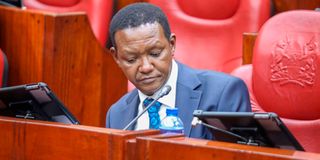
Labour and Social Protection Cabinet Secretary Dr Alfred Mutua before the Senate Committee on Labour and Social Welfare in Nairobi on May 6, 2025.
Mr Murkomen has come under attack for growing insecurity cases and poor human rights record.
Mr Mbadi is in the eye of a storm over his utterances that paint him as a minister for his region, while CS Mutua has been dragged into a failed overseas job programme by the government.
A Missing Voices 2024 report launched last Tuesday revealed that 104 extrajudicial killings were recorded last year. On the other hand, enforced disappearances went up five times in 2024, hitting 55 compared to 2023 when 10 cases were recorded. Prior to 2024, the year 2019, with 38, had the highest number of enforced disappearances.
Law Society of Kenya president Faith Odhiambo demanded that rogue police officers liable for the offences step down to allow for investigations. “Enforced disappearances and extrajudicial killings are not bad apples, but symptoms of failure that require constitutional fumigation. The bad officers must be rooted out because they swore a pledge to uphold the rule of law,” she said.
Former Chief Justice David Maraga blasted the government for failing to ratify human rights conventions and related frameworks, enforced disappearances and extrajudicial killings. “The findings are deeply disconcerting. There’s a sharp increase of state-sponsored intimidation and suppression and the report underscores an urgent need for systemic reforms in the state security agencies,” Mr Maraga said.
Adding to the growing headaches, the United Democratic Alliance (UDA) leader is currently battling against a shadow of the Kenyatta family that has been unrelenting in its push to have the youth agitate for proper governance. Former President Uhuru Kenyatta’s brother Muhoho Kenyatta last Monday joined his elder brother in calling on the youth to stand up and challenge the status quo by taking over leadership positions, saying they have played second fiddle for far too long. The businessman also slammed the current system of governance, which he termed a stumbling block to the youth.
“It is their time now to grasp and take over the mantle of leadership, and as such the stewardship of our continent with their passion, innovation, and energy,” said Mr Muhoho in his address during the opening of the Duke of Edinburgh’s International Award Africa Regional Conference in Mombasa.
Weeks ago, Uhuru called on the youth to stand up and be counted in the fight for liberation.
He urged the youth to embrace their role as freedom fighters of this era, remarks seen as a push for a youth-led revolution in Kenya and beyond. “This is the moment for each and every one of you to step onto the stage; your time has come. You have the numbers, you have the time, and you have the energy to get involved and stay involved in governance discussions until you effect the changes you wish to see.
“The problem with some is peddling fear … Nothing lasts forever. Gen Z, you are the story of the future. Fight for your rights. Do not sit idle and see everything you have worked for be taken away; do not let it happen,” he said.
A surprise ceasefire between the President and his predecessor sealed in Ichaweri, Gatundu South, last December appears to have fallen apart, exposing a greater divide between their camps. Adding to the storm, the two-faced approach by former premier Raila Odinga to the broad-based government, with the ODM leader speaking from both sides of the mouth, has put Dr Ruto in an awkward position.
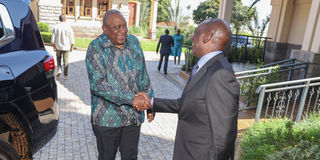
President William Ruto pays a courtesy call to former President Uhuru Kenyatta at his Gatundu home on December 9, 2024.
Mr Odinga has been scathing in his criticism of the government, where his lieutenants serve. “When Mr [Edwin] Sifuna speaks, he speaks on behalf of the party. We have a firm stand and have an arrangement with Kenya Kwanza, which we put in black and white, the 10-point agenda, which we want to be fully implemented,” he said on Friday.
ODM secretary-general Edwin Sifuna and Siaya Governor James Orengo have continued their public criticism of the broad-based government, saying they do not recognise the arrangement. “Personally, I do not recognise any entity referred to as ‘broad-based,’” Mr Sifuna said.
Recently, Kisumu Governor Anyang’ Nyong’o opposed the government’s plan to lease sugar companies in Western Kenya, terming it opaque and an economic coup against farmers, despite a nod by his party leader. The governor had to be called to the state House on Thursday for talks to quell him.
A day later, Agriculture CS Mutahi Kagwe announced that the four sugar companies will be leased for only 30 years to local firms, following broad-based consultations.
The President also continues to face a political rebellion in the vote-rich Mt Kenya region fuelled by his impeached former deputy Rigathi Gachagua. The court’s decision last Friday that a three-judge bench that paved the way for Mr Gachagua’s ouster was appointed illegally will embolden the former deputy president.
The courts have also been on the case of the current regime handing President Ruto a string of losses, quashing several policies and programmes fronted by the national government.
Last month, the Court of Appeal dealt a huge blow to plans by the government to sell some 11 parastatals by declining to suspend the judgment that had quashed the Privatisation Act, 2023.
The setback came days after the courts declared unconstitutional a task force President Ruto appointed on police reforms, adding to the list of derailed projects touching on health, education and infrastructure, including the cancelled Adani Group deals to upgrade the main airport and power lines.
Earlier this month, Justice Lawrence Mugambi nullified the formation of a task force on police and prison reforms chaired by former Chief Justice David Maraga, throwing into jeopardy the recommendations contained in the team’s report.
President Ruto is also contending with attacks on his administration over alleged complicity in the assassination of Kasipul MP Charles Ong’ondo Were.
ODM chairperson Gladys Wanga has directed blame for the murder of the MP at the police, questioning why no action had been taken despite the late MP having filed formal reports about threats to his life.
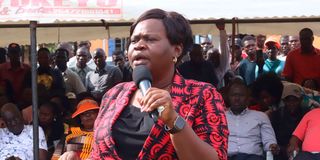
Homa Bay Governor Gladys Wanga at a past event.
The Homa Bay governor warned the government against cover-ups, demanding action, saying the opposition party did not sign up for assassination of its members when it agreed to work with UDA.
“We will not take this lying down. We have counted one too many. Were was killed like a chicken, humiliated like a thief, yet he never stole from anyone. We don’t want stories or cover-ups,” said Ms Wanga.
“We have said we are working together, but we did not sign up for the assassination of our members. The entire Homa Bay region is an ODM zone. We will not agree with people shouting UDA in the presence of my party leader. It will not happen under my watch as ODM chairperson,” she added.
For his part, State House spokesperson Hussein Mohamed said governing is not magic or an overnight affair.
He argued that the scale and ambition of the transformation being implemented by the government is unprecedented and cannot be accomplished in weeks or months.
“The idea that implementation is slow is wishful, and there is a reason why administrations are conferred with 5-year mandates,” said Mr Mohamed.
“It is absurd that people are trying to normalise extremely unreasonable expectations as though any of the major projects underpinning the Bottom-Up Economic Transformation Agenda could be completed in a matter of days,” he added.
Mr Mohamed pointed out that it can no longer be denied that the agenda of the Kenya Kwanza administration is not only progressing well, but it is also visible in every part of Kenya.
He said that the Social Health Authority and the universal health coverage are progressing well, having registered over 22 million members in the past six months, with 45,000 Kenyans registering as members of SHA daily.
The affordable housing and markets’ agenda, he said, is also on course with close to 150,000 are under construction, with some in Mukuru (Nairobi), Kianyaga (Kirinyaga) and Homa Bay nearing completion and occupation as early as next week in Mukuru.
On Mr Odinga blowing hot and cold, Mr Mohamed said it is imaginary to invent fiction that casts aspersions on the ODM leader’s commitment.
“The headaches you enumerate are fundamentally imaginary. The broad-based arrangement is firm and secure, and no party to it is having concerns, doubts or anxieties over any of its articles,” said Mr Mohamed. “Its leadership is unanimous about the promise of delivering stability and a framework for revitalising the transformation agenda.”
On reference to “the shadow of Kenyatta”, the State House spokesperson termed it another wild figment.
“The retired President is busy with important regional assignments for which he is facilitated by the government,” he said.
“The invitation to chase shadows and imagine crises is one we overwhelmingly reject.”


